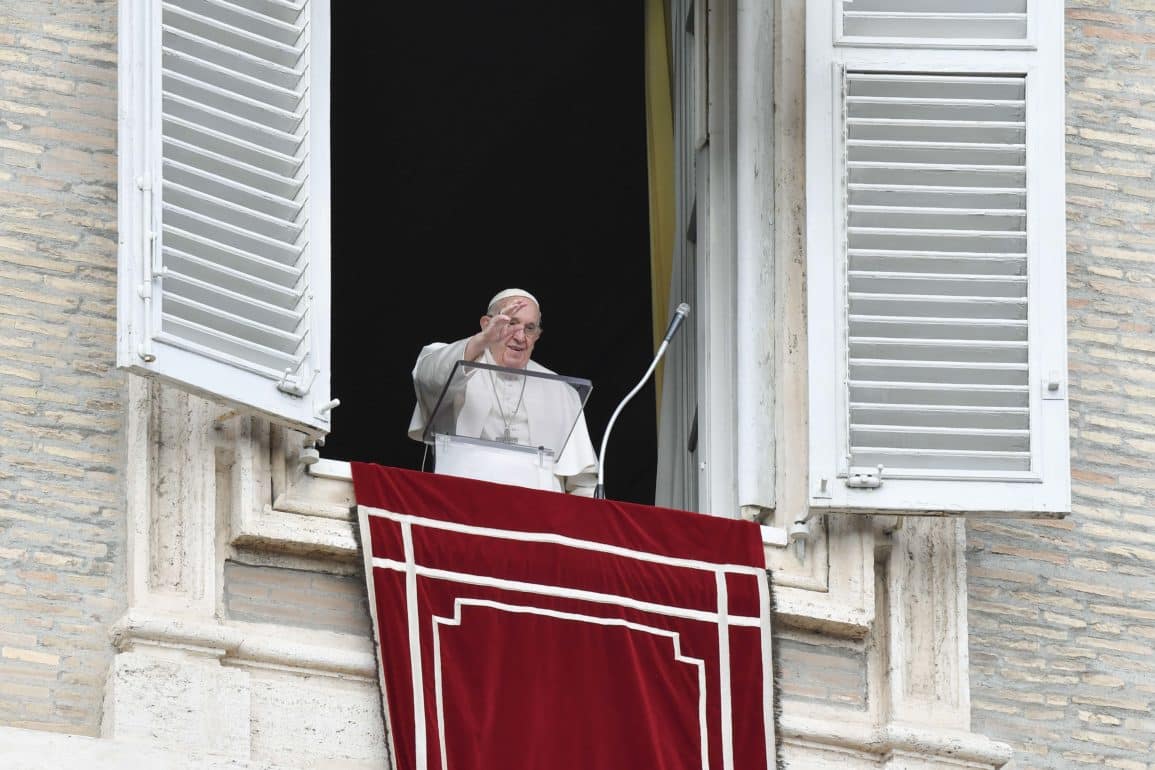Having concluded the celebration of Holy Mass in the Sistine Chapel on the Feast of the Baptism of the Lord with the Rite of Baptism of Children, at 12 noon the Holy Father Francis looked out of the studio window in the Vatican Apostolic Palace to recite the Angelus with the faithful and pilgrims gathered in St Peter’s Square.
These were the Pope’s words in introducing the Marian prayer:
Before the Angelus
Dear brothers and sisters, buongiorno!
Today we celebrate the Feast of the Baptism of the Lord, and the Gospel presents us with an astonishing scene: it is the first time that Jesus appears in public after his hidden birth in Nazareth; he arrives on the bank of the River Jordan to be baptized by John (Mt 3:13-17). It is a rite by which the people repented and committed to converting; a liturgical hymn says that the people went to be baptized “bare of soul and barefoot” – an open, naked soul, without covering anything – that is, with humility and with a transparent heart. But, seeing Jesus mingling with the sinners, we are surprised and ask ourselves: why did Jesus make that choice? He, the Saint of God, the Son of God without sin, why did he make that choice? We find the answer in Jesus’ words to John: “Let it be so now; for thus it is fitting for us to fulfil all righteousness” (v. 15). Fulfil all righteousness: what does it mean?
By having himself baptized, Jesus reveals God’s justice, that justice He came to bring into the world. Very often we have a limited idea of justice, and think that it means: those who do wrong pay, and in this way compensate for the wrong they have done. But God’s justice, as the Scripture teaches, is much greater: it does not have as its end the condemnation of the guilty, but their salvation and rebirth, making them righteous: from unjust to just. It is a justice that comes from love, from the depths of compassion and mercy that are the very heart of God, the Father who is moved when we are oppressed by evil and fall under the weight of sins and fragility. God’s justice, then, is not intended to distribute penalties and punishments but rather, as the Apostle Paul affirms, it consists of making us, his children, righteous (cf. Rm 3:22-31), freeing us from the snares of evil, healing us, raising us up again. The Lord is always there, not ready to punish us, but with his hand outstretched to help us rise up. And so, we understand that, on the banks of the Jordan, Jesus reveals to us the meaning of his mission: He came to fulfil divine justice, which is that of saving sinners; he came to take on his own shoulders the sin of the world and to descend into the waters of the abyss, death, so as to rescue us from drowning. He shows us today that the true justice of God is the mercy that saves. We are afraid to think that God is mercy, but God is mercy, because his justice is indeed the mercy that saves, it is the love that shares our human condition, that makes itself close, in solidarity with our suffering, entering into our darkness to restore light.
Benedict XVI affirmed that “God desired to save us by going to the bottom of this abyss himself so that every person, even those who have fallen so low that they can no longer perceive Heaven, may find God’s hand to cling to and rise from the darkness to see again the light for which he or she was made” (Homily, 13 January 2008).
Brothers and sisters, we are afraid to think of such a merciful justice. Let us go ahead: God is merciful. His justice is merciful. Let us allow ourselves to be taken by the hand by Him. We too, disciples of Jesus, are required to exercise justice in this way, in relationships with others, in the Church, in society: not with the harshness of those who judge and condemn, dividing people into good and bad, but with the mercy of those who welcome by sharing the wounds and frailties of their sisters and brothers, so as to lift them up. I would like to put it like this: not dividing, but sharing. Not dividing, but sharing. Let us do as Jesus did: let us share, let us carry each other’s burdens instead of gossiping and destroying, let us look at each other with compassion, let us help each other. Let us ask ourselves: am I a person who divides or shares? Think a little: am I a disciple of Jesus’ love or a disciple of gossip, that divides. Gossip is a lethal weapon: it kills, it kills love, it kills society, it kills fraternity. Let us ask ourselves: am I a person who divides or a person who shares? And now let us pray to Our Lady, who gave life to Jesus, immersing him in our frailty so that we might receive life again.










